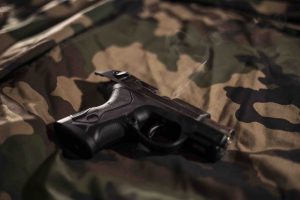 The trial of George Kleopa began Tuesday after eight years slogging its way through the court system. Kleopa is accused of killing his then-girlfriend, Michele Peters, with whom he lived. Interestingly, Kleopa is being charged with involuntary manslaughter, as opposed to second- or first-degree murder. Kleopa claims that he asked Michele to hand him a gun so that he could clean it when the gun misfired and shot her. The bullet entered her right cheek and became lodged in her brain. She was killed.
The trial of George Kleopa began Tuesday after eight years slogging its way through the court system. Kleopa is accused of killing his then-girlfriend, Michele Peters, with whom he lived. Interestingly, Kleopa is being charged with involuntary manslaughter, as opposed to second- or first-degree murder. Kleopa claims that he asked Michele to hand him a gun so that he could clean it when the gun misfired and shot her. The bullet entered her right cheek and became lodged in her brain. She was killed.
The Background
Kleopa and Peters had been together for 10 years before her death. They had two young sons together. By all accounts, Kleopa was “hysterical” after the accident and paramedics recalled having to pull him off his girlfriend’s body after which he cried on the couch.
While Kleopa appears sympathetic here, there is one fact that caused prosecutors to press charges. According to one of the officers who arrived at the scene, there was no cleaning kit in the living room where the gun was and Kleopa later admitted he was not sure where the cleaning kit was. There is some indication that Kleopa may have been “playing” with the gun when it went off.
Additionally, there were accusations aimed at Kleopa that he physically and verbally abused Peters, but this evidence was not allowed to be heard by the jury. Peters’ mother maintains that she was about to leave Kleopa before the shooting occurred. Lastly, there was testimony from a neighbor who claimed that he heard Kleopa and Peters arguing before the shooting, but none of this evidence was allowed before the jury.
Prosecutors brought forth one witness who spoke of the gun that killed Peters, a Springfield XE .40 caliber semi-automatic handgun, which he maintained had several safety features that made a misfire “extremely unlikely.”
If all that is true, however, then why did the prosecution not press for harsher charges?
Involuntary Manslaughter
Involuntary manslaughter involves a death caused by recklessness, not malice. Prosecutors do not need to prove that Kleopa intended to harm his girlfriend, only that he behaved in a manner that endangered her life and others. Typically, those charged with involuntary manslaughter serve prison sentences of between three and five years.
In order to charge or successfully convict someone of murder (either first- or second-degree), the prosecution must show that the defendant intended to harm or kill the victim. In this instance, there is insufficient evidence that Kleopa had malicious intent and what evidence does exist, has been barred from the courtroom.
On the other hand, the prosecution finds themselves in the equally difficult position of proving that Kleopa behaved recklessly or negligently and that led directly to his girlfriend’s death.
Talk to a Chicago Criminal Defense Attorney
If you are accused of a serious violent crime in the Chicago area, David Friedberg can help. Our firm has represented defendants facing criminal charges in both state and federal court and can help protect you from overzealous prosecutors and speculative motives. Call us today at (312) 560-7100 or talk to us online for more information.
 Chicago Criminal Lawyer Blog
Chicago Criminal Lawyer Blog


